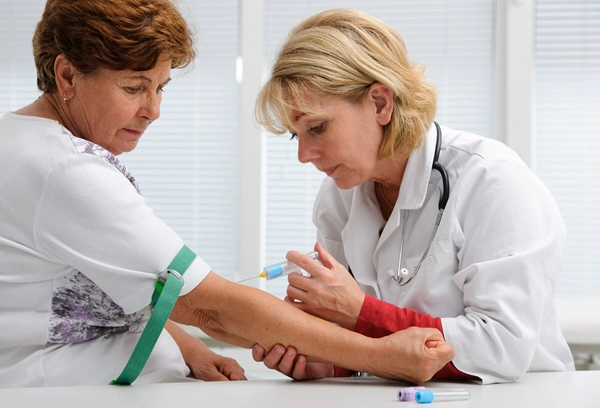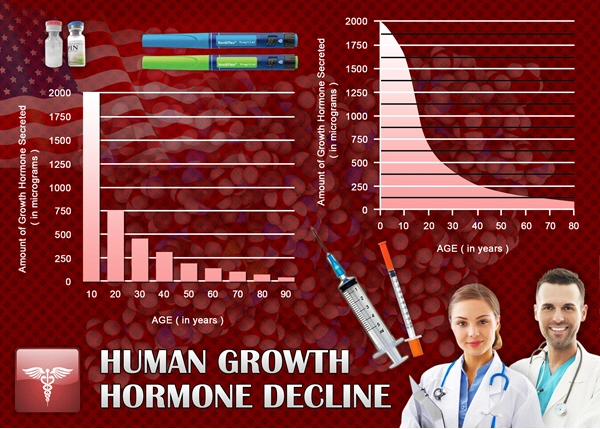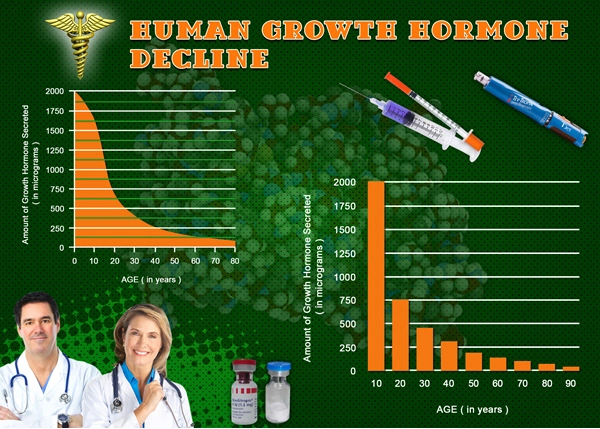 Adult-Onset HGH Deficiency and Cognitive Impairment
Adult-Onset HGH Deficiency and Cognitive Impairment
Human growth hormone (HGH) is a naturally occurring hormone that is produced by the pituitary gland. It is responsible for a variety of bodily functions, including growth, development, and metabolism. HGH also plays a role in cognitive function.
In adults, HGH is thought to help protect the brain from damage and to promote the growth of new brain cells. HGH deficiency can lead to a number of cognitive problems, including:
- Memory problems
- Concentration problems
- Slowed thinking
- Difficulty learning new things
- Impaired decision-making
The exact mechanism by which HGH deficiency causes cognitive impairment is not fully understood. However, it is thought that HGH may help to protect the brain from damage by promoting the growth of new brain cells and by reducing inflammation.
 HGH deficiency is often diagnosed in adults who have a history of childhood growth hormone deficiency. However, it can also occur in adults who have never had growth hormone deficiency. Some of the causes of adult-onset HGH deficiency include:
HGH deficiency is often diagnosed in adults who have a history of childhood growth hormone deficiency. However, it can also occur in adults who have never had growth hormone deficiency. Some of the causes of adult-onset HGH deficiency include:
- Pituitary gland tumors(The exact underlying cause of pituitary gland tumors is unknown. However, there are a number of factors that may increase the risk of developing a pituitary tumor, including age – pituitary tumors are more common in adults than in children; sex – women are more likely than men to develop pituitary tumors; family history – if you have a family history of pituitary tumors, you are more likely to develop a pituitary tumor yourself; certain medical conditions – people with certain medical conditions, such as multiple endocrine neoplasia type 1 (MEN1), are at an increased risk of developing pituitary tumors; exposure to certain chemicals or radiation – exposure to certain chemicals or radiation may increase the risk of developing a pituitary tumor. It is important to note that most people with pituitary tumors do not have any known risk factors. Nevertheless, regardless of the underlying cause of the tumors, in many cases HGH supplementation has been effective in totally eliminating the deficiency and all its terrible symptoms.)
- Head injuries
- Certain medications
(There are a few ways that certain medications might cause HGH deficiency: Medications that damage the pituitary gland – some medications, such as radiation therapy and chemotherapy, can damage the pituitary gland. This can lead to a decrease in the production of HGH; medications that block the release of HGH – some medications, such as steroids, can block the release of HGH and this can also lead to a decrease in the production of HGH; medications that increase the metabolism of HGH – some medications, such as alcohol, can increase the metabolism of HGH and this can also lead to a decrease in the production of HGH. It is important to note that not all people who take these medications will develop HGH deficiency. The risk of developing HGH deficiency varies depending on the medication, the dose of the medication, and the length of time the medication is taken. If you are taking a medication that you think might be causing HGH deficiency, you should contact us and set up an appointment with one of our doctors. We can test your HGH levels to see if you have HGH deficiency. If you do have HGH deficiency, your doctor can discuss all the options with you.) - Autoimmune diseases
(Autoimmune diseases are diseases in which the body's immune system attacks its own tissues. In the case of HGH deficiency, the immune system may attack the cells in the pituitary gland that produce HGH. This can lead to a decrease in the production of HGH, which can cause a number of symptoms, including:
- Growth retardation in children
- Short stature in adults
- Fatigue
- Muscle weakness
- Low sex drive
- Depression
- Thinning skin
- Increased risk of fractures
 If you have an autoimmune disease and you are experiencing any of these symptoms, you should make an appointment and talk to one of the board-certified doctors at our clinic. He can test your HGH levels to see if you have HGH deficiency. If you do have HGH deficiency, rest assured that there is a path forward to a better life.
If you have an autoimmune disease and you are experiencing any of these symptoms, you should make an appointment and talk to one of the board-certified doctors at our clinic. He can test your HGH levels to see if you have HGH deficiency. If you do have HGH deficiency, rest assured that there is a path forward to a better life.
Some of the autoimmune diseases that can cause HGH deficiency include:
- Amyloidosis
- Graves' disease
- Hashimoto's thyroiditis
- Lupus erythematosus
- Multiple sclerosis
- Sjögren's syndrome
It is important to note that not all people with autoimmune diseases will develop HGH deficiency. The risk of developing HGH deficiency varies depending on the autoimmune disease, the severity of the autoimmune disease, and the treatment for the autoimmune disease.)
If you are experiencing any of the cognitive problems listed above, you should talk to one of the board-certified physicians at our clinic. HGH replacement therapy may be an effective treatment for your adult-onset HGH deficiency.

- Live Consciously and Live Better [Last Updated On: September 3rd, 2025] [Originally Added On: November 4th, 2020]
- HGH Injections: A New Revolution in Longevity, Health, Medicine, and Life Quality -- HGH Injection [Last Updated On: September 2nd, 2025] [Originally Added On: November 10th, 2020]
- The Baby Boomer Dilemma -- To Use, or Not to Use, HGH to Fix Your Lifestyle Mistakes [Last Updated On: November 16th, 2025] [Originally Added On: January 10th, 2021]
- How HGH and Testosterone Can Make a Huge Difference in Your Life [Last Updated On: October 24th, 2025] [Originally Added On: January 11th, 2021]
- 34 Good Health Tips to Improve Your Health and Wellness [Last Updated On: October 20th, 2025] [Originally Added On: January 17th, 2021]
- Personal Human Growth Hormone HGH Testimonial [Last Updated On: October 21st, 2025] [Originally Added On: January 18th, 2021]
- Starting Your HGH Therapy Program [Last Updated On: October 18th, 2025] [Originally Added On: January 26th, 2021]
- Human Growth Hormone for Body Sculpting [Last Updated On: August 20th, 2025] [Originally Added On: January 27th, 2021]
- Human Growth Hormone Replacement Therapy for Men [Last Updated On: May 24th, 2025] [Originally Added On: January 29th, 2021]
- Get Optimal Results on an HRT Program with Proper and Effective Nutrition [Last Updated On: February 17th, 2025] [Originally Added On: February 4th, 2021]
- An Introduction to the Lymphatic System [Last Updated On: October 19th, 2025] [Originally Added On: February 6th, 2021]
- Basic Human Growth Hormone Information [Last Updated On: October 23rd, 2025] [Originally Added On: February 11th, 2021]
- Buying HGH Legally. Is HGH legal in the United States ? [Last Updated On: October 22nd, 2025] [Originally Added On: February 18th, 2021]
- Zap The Ugly Fat With Human Growth Hormone [Last Updated On: October 15th, 2025] [Originally Added On: February 20th, 2021]
- COVID-19 Global Pandemic: Boosting Your Immune Defense with Growth Hormone [Last Updated On: August 22nd, 2025] [Originally Added On: February 24th, 2021]
- Early Exposure to BPAs Can Cause Serious Damage Later in Life for Elderly Men [Last Updated On: May 18th, 2025] [Originally Added On: March 2nd, 2021]
- Ascendis Pharma Given the Go-Ahead by FDA to Develop Long-Acting HGH Treatment [Last Updated On: August 23rd, 2025] [Originally Added On: March 4th, 2021]
- Growth Hormone Leads to Liver Regeneration and helps support healing post surgery. [Last Updated On: September 5th, 2025] [Originally Added On: March 5th, 2021]
- Testosterone Levels Main Determining Factor Behind Fracture Risk in Older Men [Last Updated On: March 23rd, 2025] [Originally Added On: April 23rd, 2021]
- Anti-Aging HGH Research of Growth Hormone Injections [Last Updated On: October 17th, 2025] [Originally Added On: April 24th, 2021]
- Anti-Aging News: HGH Shown to Reverse Aging in New Study! [Last Updated On: May 23rd, 2025] [Originally Added On: May 4th, 2021]
- Stop Premature Aging Dead in its Tracks with Growth Hormone! [Last Updated On: May 28th, 2025] [Originally Added On: May 14th, 2021]
- Human Growth Hormone and Cell Regeneration [Last Updated On: October 16th, 2025] [Originally Added On: May 20th, 2021]
- Increased Belly Fat? Blame it on Your Hormones! [Last Updated On: May 22nd, 2025] [Originally Added On: May 21st, 2021]
- Joe Rogan -- Palumboism Due to Hormone Abuse? [Last Updated On: October 14th, 2025] [Originally Added On: May 22nd, 2021]
- Hormone Therapy May Help Post-Menopausal Women Postpone Onset of Atherosclerosis [Last Updated On: October 13th, 2025] [Originally Added On: May 23rd, 2021]
- If You Suffer From Low-T, You’re More at Risk for Severe COVID-19 Symptoms [Last Updated On: May 30th, 2025] [Originally Added On: May 30th, 2021]
- Hormone Effects:: My Mind Is Racing and I Feel Like I’m Going Crazy - Could Hormones Be the Cause? [Last Updated On: February 20th, 2025] [Originally Added On: August 3rd, 2021]
- Fake News About Hormone Replacement Therapy for Women [Last Updated On: May 17th, 2025] [Originally Added On: September 16th, 2021]
- Overcome HGH Deficiency with Ipamorelin Acetate Injections [Last Updated On: September 18th, 2025] [Originally Added On: September 21st, 2021]
- About to be a Father? How Hormones Will Affect Your Parenting [Last Updated On: April 8th, 2025] [Originally Added On: March 7th, 2022]
- Fighting Off Brain Fog to Think More Clearly [Last Updated On: November 7th, 2025] [Originally Added On: May 30th, 2022]
- HGH Vs. Testosterone: Which One Do You Need? [Last Updated On: May 4th, 2025] [Originally Added On: November 30th, 2022]
- The Role of Human Growth Hormone (HGH) and Cognitive Impairment [Last Updated On: November 14th, 2025] [Originally Added On: February 11th, 2025]
- The Impact of Hormones on Mental Health [Last Updated On: February 17th, 2025] [Originally Added On: February 17th, 2025]



List of USA state clinics - click a flag below for blood testing clinics.
Word Count: 778


















































